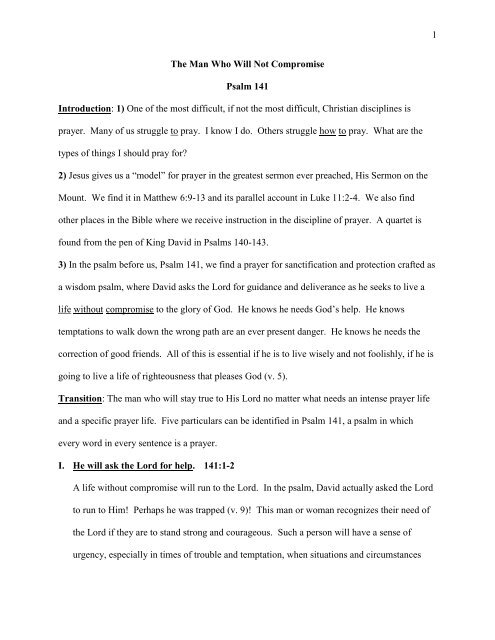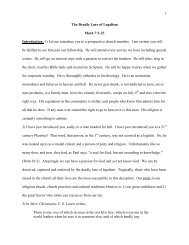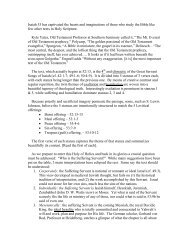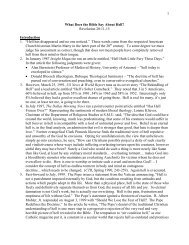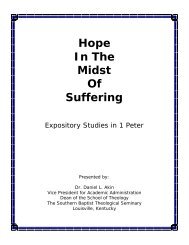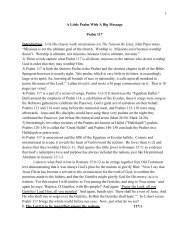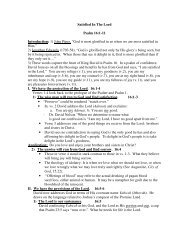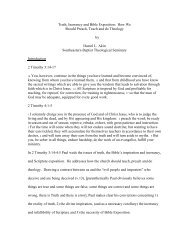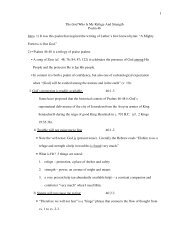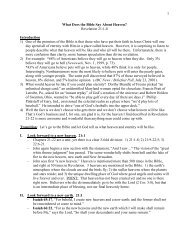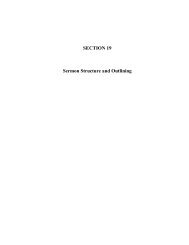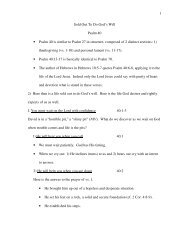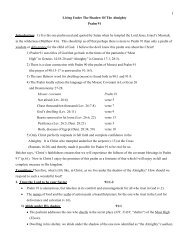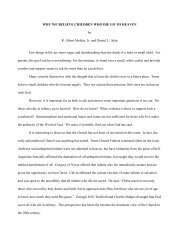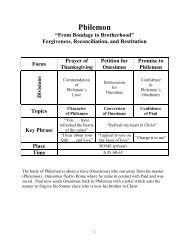1 The Man Who Will Not Compromise Psalm 141 ... - Daniel Akin
1 The Man Who Will Not Compromise Psalm 141 ... - Daniel Akin
1 The Man Who Will Not Compromise Psalm 141 ... - Daniel Akin
Create successful ePaper yourself
Turn your PDF publications into a flip-book with our unique Google optimized e-Paper software.
1<br />
<strong>The</strong> <strong>Man</strong> <strong>Who</strong> <strong>Will</strong> <strong>Not</strong> <strong>Compromise</strong><br />
<strong>Psalm</strong> <strong>141</strong><br />
Introduction: 1) One of the most difficult, if not the most difficult, Christian disciplines is<br />
prayer. <strong>Man</strong>y of us struggle to pray. I know I do. Others struggle how to pray. What are the<br />
types of things I should pray for?<br />
2) Jesus gives us a “model” for prayer in the greatest sermon ever preached, His Sermon on the<br />
Mount. We find it in Matthew 6:9-13 and its parallel account in Luke 11:2-4. We also find<br />
other places in the Bible where we receive instruction in the discipline of prayer. A quartet is<br />
found from the pen of King David in <strong>Psalm</strong>s 140-143.<br />
3) In the psalm before us, <strong>Psalm</strong> <strong>141</strong>, we find a prayer for sanctification and protection crafted as<br />
a wisdom psalm, where David asks the Lord for guidance and deliverance as he seeks to live a<br />
life without compromise to the glory of God. He knows he needs God’s help. He knows<br />
temptations to walk down the wrong path are an ever present danger. He knows he needs the<br />
correction of good friends. All of this is essential if he is to live wisely and not foolishly, if he is<br />
going to live a life of righteousness that pleases God (v. 5).<br />
Transition: <strong>The</strong> man who will stay true to His Lord no matter what needs an intense prayer life<br />
and a specific prayer life. Five particulars can be identified in <strong>Psalm</strong> <strong>141</strong>, a psalm in which<br />
every word in every sentence is a prayer.<br />
I. He will ask the Lord for help. <strong>141</strong>:1-2<br />
A life without compromise will run to the Lord. In the psalm, David actually asked the Lord<br />
to run to Him! Perhaps he was trapped (v. 9)! This man or woman recognizes their need of<br />
the Lord if they are to stand strong and courageous. Such a person will have a sense of<br />
urgency, especially in times of trouble and temptation, when situations and circumstances
2<br />
arise that test your devotion to the Lord who should have your attention, “your eyes” (v.8).<br />
When the evil one and his schemes are looking you in the face how should you respond?<br />
1) Call on the Lord. <strong>141</strong>:1<br />
Twice David cries or calls to Yahweh (Jehovah). <strong>The</strong>re is desperation in his voice as<br />
he asks the Lord to 1) make haste (NIV, “come quickly”) and 2) give ear to my voice.<br />
Faced with the sirens of the modern world that calls us to sell our soul for personal<br />
peace and prosperity, the man who will not compromise cries to the Lord.<br />
2) Worship the Lord. <strong>141</strong>:2<br />
Urgency is complemented by worship. <strong>The</strong> Lord he runs to is the Lord he worships.<br />
David wants the Lord to know that though he has run to Him (or asked the Lord to<br />
run to him), no disrespect is intended. He needs Him. He wants Him. He will<br />
worship Him.<br />
Let my prayer be as incense means let my prayer be a sweet aroma and a pleasing<br />
offering.<br />
Lifting up of the hands (cf. Ps. 134:2) was a demonstration of worship and adoration.<br />
Reference to the evening sacrifice (note the word “as”) may indicate this was a prayer<br />
prayed at night as he prepared to go to bed, a prayer he voiced after a long and<br />
difficult day.<br />
II. He will ask the Lord for wisdom. <strong>141</strong>:3-4<br />
James 1:5 says, “if any of you lacks wisdom, let him ask of God who gives to all<br />
liberally and without reproach, and it will be given to him.”
3<br />
Wisdom is something we should ask the Lord for daily and specifically. For me it is<br />
in the areas of patience, decision-making, words, and the dispositions of my heart and<br />
mind that I need the Lord’s perspective and enablement.<br />
“Wisdom is the ability to see life as God sees it and then respond as He would.”<br />
David highlights four areas where wisdom from above is essential (cf James 3:13-18).<br />
1) Give me wisdom with my words. <strong>141</strong>:3<br />
With beautiful Hebrew poetic parallelism David asks God to temper his tongue and<br />
muzzle his mouth.<br />
Set a guard…my mouth<br />
Keep watch over the door of my lips<br />
James 3:1-12 provides an expanded commentary on the trouble with the tongue.<br />
Ill. “sticks and stones…”<br />
2) Give me wisdom in my heart. <strong>141</strong>:4<br />
Proverbs 4:23 reminds us, “Keep your heart with all diligence, for out of it spring the<br />
issues of life.”<br />
Jeremiah 17:9 says, “<strong>The</strong> heart is deceitful above all things, and desperately wicked;<br />
who can know it?”<br />
David knew, as must we, the deceptive power of the heart; the real you and me on the<br />
inside. He knew he could not trust it. He needed the Lord to guide and control it! He<br />
knew we all need a “spiritual heart transplant.” Jesus taught us to pray, “Lead us not<br />
into temptation” (Matthew 6:13). To avoid the snare of temptation, we need the<br />
Lord’s help.
4<br />
3) Give me wisdom in my actions. <strong>141</strong>:4<br />
David notes the close connection between what I think and what I do. If my heart is<br />
leaning toward evil it will eventually do evil.<br />
Jesus powerfully reinforces this when in Mark 7:21-23 he says, “For from within, out<br />
of the heart of men, proceed evil thoughts, adulteries, fornications, murders, thefts,<br />
covetousness, wickedness, deceit, lewdness, an evil eye, blasphemy, pride,<br />
foolishness. All these evil things come from within and defile a man.”<br />
4) Give me wisdom with my companions. <strong>141</strong>:4<br />
Often Satan tempts us thru our companions, the people we hang out with. <strong>The</strong><br />
wisdom of choosing good friends cannot be overstated.<br />
David warns us concerning those who are evildoers, but whose evil is camouflaged<br />
with delicacies. <strong>The</strong>se are men of influence and status, popular and powerful, whose<br />
wealth and position allow them to enjoy the “finer things of life” as the world<br />
measures things.<br />
In our own strength and “will power” we will give in and maybe even sell out. We<br />
must ask the Lord to not even allow our heart any inclination at all in this direction.<br />
III. He will ask the Lord for good friends. <strong>141</strong>:5<br />
One of the great blessings of life has been good friends, friends you can trust<br />
guarding your back in a foxhole. <strong>The</strong> longer I live, the more I realize such friends are<br />
1) few in number, 2) valuable beyond words and 3) essential to a consistent walk with<br />
God over a lifetime.<br />
Your friends will influence you. No debate. No question about it. Now, what do you<br />
need, according to v. 5, from these “fellow foxhole friends?”
5<br />
1) Let them rebuke me when I need it.<br />
David says seek out friends who love you enough to rebuke you even when it hurts.<br />
You need friends who will strike you, hit you with hard, but healing, words.<br />
It is actually an act of “hesed” (NASV, “kindness”; HCSB, “faithful love”)<br />
In <strong>The</strong> Jesus Storybook Bible: Every Story Whispers His Name, such love, whose<br />
origin is always God, is said to be, “never stopping, never giving up, unbreaking,<br />
always and forever love.”<br />
I need, you need, we all need, rebukes from friends who love us like this.<br />
2) Let me receive it when they do it.<br />
How do you handle rebuke and correction? It is not easy to receive for any of us.<br />
David was no different. David has to ask the Lord to help him in this.<br />
“Lord, let him strike me. Lord, let him rebuke me.”<br />
“Lord, let me see it as hesed.” Lord, let me receive it as excellent oil and an act of<br />
honor and respect. He/she loves me enough to tell me the truth and make me better<br />
for You! Praise the Lord! Don’t let me refuse it, help me to receive it. Help me<br />
remember Proverbs 27:6, “Faithful are the wounds of a friend.”<br />
IV. He will ask the Lord for vindication. <strong>141</strong>:5-7<br />
Once again we encounter what is called an imprecatory psalm where the psalmist prays in<br />
very strong language for God to judge his enemies. Ultimately because of their evil, they<br />
are the enemies of God. <strong>The</strong>se are men of power and authority, “judges” or “rulers.”<br />
David’s words are striking and startle our modern sensibilities. And yet do not miss the<br />
redemptive note in this stanza, tucked away at the end of v. 6.
6<br />
1) Ask Him to judge the works of the wicked. <strong>141</strong>:5-7<br />
David will continually pray against evil and those determined to do evil (v. 5).<br />
He asks God to throw them off the side of the cliff (v. 6).<br />
He asks God to scatter their bones so that they do not even receive a decent burial<br />
(v. 7). This would point to their being under God’s curse and judgment. One<br />
can/should hear the tremors of the end time judgments so graphically depicted in<br />
the apocalypse of Revelation 6-19, a judgment poured out by none other than the<br />
Lord Jesus Christ Himself.<br />
2) Ask Him to approve the words of the righteous. <strong>141</strong>:6<br />
Such harsh words have a redemptive goal: that they would hear and receive the words<br />
of David and come to their spiritual senses.<br />
V. He will ask the Lord for protection. <strong>141</strong>:8-10<br />
David sees life as a titanic battle between good and evil, right and wrong, godliness<br />
and ungodliness. He knows that to engage in this battle is to run a risk and expose<br />
himself to danger. Yet as a man who will not compromise, he has no choice and<br />
neither do we.<br />
He also knows he dare not engage this battle without the help and protection of the<br />
Lord.<br />
1) Look to Him. <strong>141</strong>:8<br />
David will keep his eyes on his king, Yahweh his Lord (NIV, “O Sovereign<br />
Lord”). He will strive to maintain a Godward, heavenly perspective (cf. Col. 3:1-<br />
4).
7<br />
2) Flee to Him. <strong>141</strong>:8-10<br />
We must run to our Lord taking refuge in Him (v. 8).<br />
We must ask the Lord to “not make my soul bare,” “give us over to death” (NIV)<br />
(v. 8).<br />
We must ask the Lord to keep us from the snares and traps laid for us by these<br />
workers of evil. (v. 9).<br />
Indeed, we may pray that they are actually ensnared by their own evil devices<br />
(boomerang judgment) which God allows us, in grace, to safely escape.<br />
Conclusion:<br />
<strong>The</strong> man who will not compromise is an incredible individual. I am not sure I have ever met<br />
such a man who completely and radically fulfills the portrait we see in <strong>Psalm</strong> <strong>141</strong>. But then I<br />
turn to Jesus and I do meet such a man. Here I discover a man who in times of trouble:<br />
1) Asked the Lord for help, for as Hebrews 5:7 teaches, “in the days of His flesh, when He<br />
had offered up prayers and supplications, with vehement cries and tears to Him who was<br />
able to save Him from death, he was heard because of godly fear.”<br />
2) Asked the Lord for wisdom, for as Mark 1:35 teaches, “in the morning, having risen a<br />
long while before daylight, He went out and departed to a solitary place; and there He<br />
prayed.<br />
3) Asked the Lord for good friends, for as Luke 4:12-13 says, “Now it came to pass in those<br />
days He went out to the mountain to pray and continued all night in prayer to God, and<br />
when it was day, He called His disciples to Himself, and from them He chose 12.”<br />
4) Asked the Lord for vindication, for in John 17:1 He prayed, “Father, the hour has come.<br />
Glorify Your Son, that Your Son may glorify You.”
8<br />
5) Asked the Lord for protection, for as He breathed His last breath he prayed, as Luke<br />
23:46 records, “Father into your hands I commit My spirit.”<br />
Here is the man who would not compromise! Here is the man we have as an example. Here<br />
is the one who enables us to live as we ought. Here is the God we honor and worship and run<br />
to that we may live a life without compromise.


